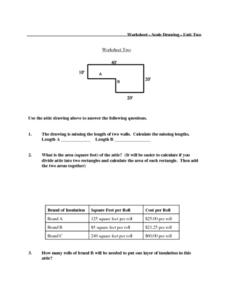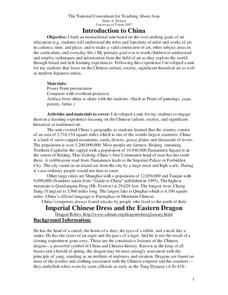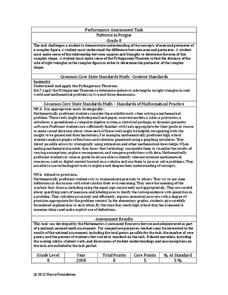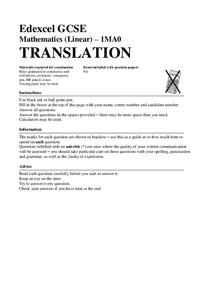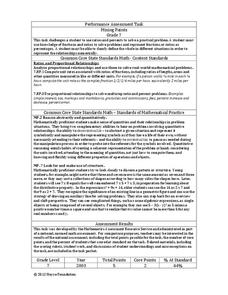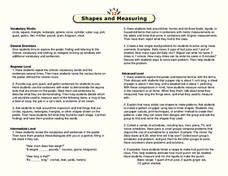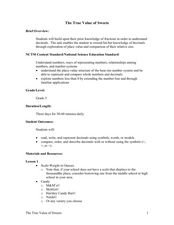Curated OER
Scale Drawing: Insulating an Attic
Have your aspiring contractors compute the length of two walls in a compound-shaped attic when given a scale drawing of it and the other dimensions. They find the area, determine the number of rolls of insulation they will need to...
Curated OER
Scale Drawing: Insulating Another Attic
Give your future household repair specialists a real-life chance to apply the concepts of ratio and proportion. Using a scale drawing, they calculate the missing dimensions of two walls of a compound-shaped attic. They then figure how...
Curated OER
Introduction to China
Compare and contrast the distinctive characteristics of art forms from various cultural, historical, and social contexts, and describe how the same subject matter is represented differently in works of art across cultures and time...
Utah Education Network (UEN)
Mathematics: Growing Patterns
Learners graph growing patterns using ordered pairs on a coordinate grid. They read The Fly on the Ceiling, a Math Myth.
Curated OER
Cold Sassy Tree: Vocabulary Development
Change places with your pupils, and let them teach their peers! Each learner signs up to teach a word from a list provided by the teacher (included here). Then, they complete a graphic organizer to help them develop a better...
Nuffield Foundation
Perimeter and Area
Use several shapes to practice finding the perimeter and area. Each page presents examples of different items, including money, the floor plan of a room, and a parking lot.
Curated OER
Grid Frame Mapping
Students map and describe small area of the schoolyard and discuss habitats.
Curated OER
Multiples
A great worksheet for scaffolding critical thinking about mathematical concepts. This resource provides students with a brief explanation of multiples followed by 29 practice problems which gradually increase in difficulty. Several...
Curated OER
Word Problem Practice Workbook
Need worksheets that challenge your middle schoolers to apply their understanding of math? Problem solved! From integers, fractions, and percents, to algebra, geometry, and probability, over 100 pages of word problem worksheets are...
EngageNY
Advanced Factoring Strategies for Quadratic Expressions (part 1)
Factoring doesn't have to be intimidating. Build on prior knowledge of multiplying binomials and factoring simple trinomials to teach advanced factoring of quadratic expressions with a activity that uses various methods of exploring the...
EngageNY
Composition of Linear Transformations 1
Learners discover that multiplying transformation matrices produces a composition of transformations. Using software, they map the transformations and relate their findings to the matrices.
EngageNY
End-of-Module Assessment Task — Precalculus (Module 1)
A transformational assessment determines how far pupils are advancing toward mastering complex and matrix standards. The assessment checks the learners' understanding of linear transformations, complex numbers and the complex plane,...
Inside Mathematics
Patterns in Prague
Designers in Prague are not diagonally challenged. The mini-assessment provides a complex pattern made from blocks. Individuals use the pattern to find the area and perimeter of the design. To find the perimeter, they use the Pythagorean...
Mathed Up!
Translations
Introduce translations as transformations that move figures in horizontal and vertical distances with a video that shows how to translate the figures. A second video covers how to determine the translation that has occurred. Pupils work...
CCSS Math Activities
Smarter Balanced Sample Items: 6th Grade Math – Claim 3
Communication is key. Eight sample items show how important communication and reasoning is for sixth grade mathematics. Part of the Claim 2-4 slide show series, the presentation uses concepts from fifth and sixth grade to illicit...
Curated OER
Fractions and Percentages 9.1
For these calculating and converting fractions and percentages worksheets, learners add and subtract fractions, solve word problems, and convert fractions to percentages and percentages to fractions. They solve 85 problems.
Curated OER
Vocabulary Game
Help scholars discover new ways to build their vocabulary. Groups create a game involving their vocabulary words. Using the jigsaw model, the groups shuffle and play the games of the other groups. Save the games and use them for other...
Mathematics Vision Project
Module 5: Modeling with Geometry
Solids come in many shapes and sizes. Using geometry, scholars create two-dimensional cross-sections of various three-dimensional objects. They develop the lesson further by finding the volume of solids. The module then shifts to finding...
Noyce Foundation
Mixing Paints
Let's paint the town equal parts yellow and violet, or simply brown. Pupils calculate the amount of blue and red paint needed to make six quarts of brown paint. Individuals then explain how they determined the percentage of the brown...
Curated OER
Draw an Inch, Walk a Mile
Students work in small groups to solve the problems presented. The main project, mapping the classroom, use these discussions to collaborate in creating a tangible demonstration of their understanding.
Houghton Mifflin Harcourt
Shapes and Measuring
Youngsters develop mathematical vocabulary with this worksheet. First, give youngsters time to identify their vocabulary words in the picture provided. Then, as a group, practice saying the vocabulary words aloud. Finally, have learners...
Houghton Mifflin Harcourt
Developing Formulas for Circles and Regular Polygons
Formulas and procedures for finding the area and circumference are not provided on this handout, so it will be best used as a practice of already-acquired skills. It is a well-rounded assignment, however, as it includes diagrams,...
Curated OER
The True Value of Sweets
Measure your pupil's learning in a lesson designed to explore decimals by weighing different candies on a scale and recording the weight. Small groups then compare and order the decimal weights on a number line to show their...
EngageNY
Adding and Subtracting Expressions with Radicals
I can multiply, so why can't I add these radicals? Mathematicians use the distributive property to explain addition of radical expressions. As they learn how to add radicals, they then apply that concept to find the perimeter of polygons.
Other popular searches
- Finding Area in Square Units
- Area Square Units
- Math Area Square Units
- Area in Square Units
- Count the Square Units
- Area of Square Units
- Area and Square Units
- Changing Square Units
- Square Units Worksheet
- Square Units Blocks
- Math Square Units
- Perimeter in Square Units


